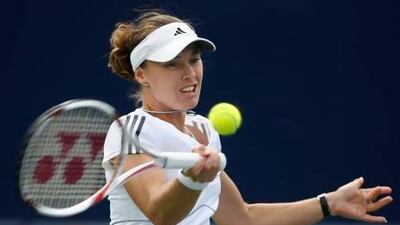No grand slam comes easy, but it is not outrageous to say that the French Open comes harder than the others. The clay is a big reason.
One common recent gripe has been how surfaces across the planet have slowed down and become homogenised. There is evidence to suggest that may not be true, though it is difficult to argue against a growing homogeneity in playing styles.
Things still have not changed at Roland Garros, though. It remains the domain of a surface specialist rather than an all-surface great (Rafael Nadal, uniquely, is both). Hard-court matches may look like clay-court battles, but they do not play out like them.
The following five, greats who never won the French Open, might attest as much.
Pete Sampras
For 13 years Sampras tried and for 13 years he failed. He may have been the greatest player ever before Roger Federer arrived, but Sampras's athletic, paced game just did not click with the slow, red clay at Roland Garros.
His best performance was in reaching the semi-finals in 1996, losing to the eventual champion Yevgeny Kafelnikov. He never got that far before or after, though three successive quarter-finals from 1992 hinted at a potential breakthrough.
Remarkably, he lost eight times in the first or second round; 14 grand slam titles represents the CV of a legend, but it is missing a crucial one.
Boris Becker
Perhaps it should not be surprising that a man who made his name on the grass of Wimbledon and became one of the greatest indoor players never won at Roland Garros.
Becker's big serve was neutered and his gallivanting to the net was too risky for clay, but unlike, say, Sampras, he sometimes looked like he could go all the way. He made three semi-finals and his best chance was probably in 1989, his best season in the game.
That year he lost to Swedish rival Stefan Edberg (another never to conquer Roland Garros) in a legendary match, fighting back from two sets down only to lose the fifth. Edberg would lose to Michael Chang in the final, but Becker never came so close to completing a career grand slam.
John McEnroe
McEnroe never won the Australian Open, either, but it says something about that era, when the Australian Open was not taken as seriously. In the perceived pecking order of slam events, not winning the French Open is seen as a bigger blight.
He had an ideal opportunity when he reached the final in 1984. McEnroe was in monstrous form that year his winning record of 82-3 remains the best ever and he was up two sets to love in the final against Ivan Lendl.
But he was distracted by a cameraman's headset on the verge of breaking Lendl's serve in the third, to such an extent that it led to one of his greatest meltdowns. He lost the three remaining sets and never reached another final.
Lindsay Davenport
Until she officially leaves the game, Venus Williams theoretically stands a shot at winning the French Open.
A first-round exit this year continued a strange record for both Williams and sister Serena in Paris. Despite dominating the game over the last decade, the sisters have a solitary win, by Serena in 2002, between them.
For a couple of years in the late 1990s, just before they really took over, Davenport looked like the new women's player prototype. Her big, precise groundstrokes took her to three majors in three years, as well as an Olympic gold, between 1996-2000.
Despite an apparent lack of mobility, her game looked good enough to succeed on clay, but the farthest she went in Paris was a semi-final loss to clay specialist Arantxa Sanchez Vicario in 1998.
Martina Hingis
Hingis was not only the world's leading player in the late '90s, but she was a unique champion.
Where the women's game was changing around her, becoming more reliant on power, Hingis was a breezy, all-court touch player, thriving from finding all kinds of angles on a tennis court.
In 1997, when she won three of the four slams and lost to Iva Majoli in the final at Roland Garros, it seemed ludicrous to think she would not eventually add the French Open to complete a career Grand Slam. In 1999, the time was upon us.
Hingis was one set and 2-0 up, when she disputed a ball of hers that had been ruled out.
The umpire checked, did not change the call and Hingis lost her cool and focus. She received a point penalty and eventually lost the match. She would never reach the final again.
Follow us

